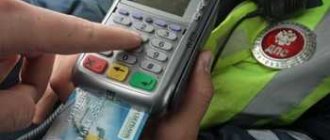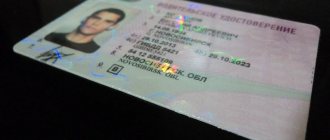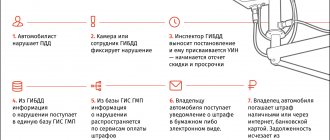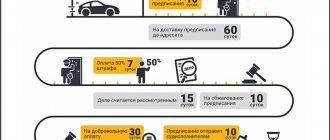What is an overdue traffic fine? When does a fine become old?
The Code of Administrative Offenses of the Russian Federation obliges a citizen to pay the fine imposed by the traffic police within 70 days from the date of receipt in the form of a copy of the resolution or a postal letter. If a motorist exercises the right to appeal to the traffic police or court, this period is frozen during the proceedings. Starting from the 71st day after receipt of the decision or the entry into force of a court decision imposing a fine, an unpaid fine is considered overdue!
Traffic police fines are lost in the mail, arrive at other addresses, or arise as a result of technical errors.
Methods of paying a fine
Paying a fine on time is not only a way to avoid debt, but also an opportunity to save money. If the motorist makes payment within 20 days of receiving the order, he will receive a 50% discount. This option does not apply to all types of fines. For example, if a driver becomes the culprit of a serious accident, he will not be able to count on compensation.
The problem with most motorists is that they only remember about the fine when the payment deadline expires. But even in this case, the driver can deposit funds. To do this, he just needs to register on the State Services portal, fill out an electronic form and make a payment. If, after a delay, the citizen was contacted by bailiffs, then he will have to pay not only the amount of the fine, but also a penalty. In this case, you should deposit funds as soon as possible.
After paying the fine, the motorist must visit the FSSP office and make sure that he has been removed from the list of debtors. You can also send a scanned copy of the receipt to the organization’s email account.
You can deposit funds in any convenient way:
- at the bank's cash desk;
- on the State Services portal;
- via terminal;
- using Internet banking.
Some time after paying the fine, the driver should check the payment status. To do this, just go to the State Services portal and select the appropriate section.
The FSSP employees send a resolution to the willful defaulters to hold them accountable. This document is handed over through a police officer or sent by mail. The period allotted for appealing and paying a fine begins to be calculated from the moment the decision is received.
Consequences of overdue traffic fines
If within 70 days the traffic police fine received by the motorist is not paid in relation to the driver/owner who was late, in accordance with Part 1 of Art. 20.25 of the Code of Administrative Offenses of the Russian Federation launches a mechanism of sanctions for late payment of a fine. The case is referred to the judicial authorities. According to the court, a motorist can:
- Receive a doubling of the overdue fine (+% of bailiffs)
- Get blocked accounts and bank cards
- Be sentenced to prison and mandatory community service
- Be put on the federal wanted list
- Temporarily lose your driver's license
- Forcibly part with part of your salary
- Pay off personal property as debt
What happens if you don’t pay old fines?
The Bailiff Service deals with the cases of stubborn debtors. The first to suffer are bank cards and accounts of the debtor. Depending on the size of the debt, the amounts owed on fines will either be written off or they will be frozen. The bailiff will attempt to contact the debtor. Inquiries about it will be sent to the place of work and to government agencies.
Further avoidance of dialogue with the bailiffs will lead to the arrest and sale of property, raids on the roads and a ban on traveling abroad. The person will be listed as unreliable in government databases.
Driving with expired traffic fines
An unpaid traffic fine assigned to a driver or car is a reason for stopping and investigation by traffic police officers. Joint patrols of traffic police and bailiffs force drivers to immediately pay fines, seize the personal property of debtors, and send forgetful drivers to the courts, where they can be sentenced to imprisonment.
Double fine or arrest for delay
Another reason why it is better not to drive with an expired traffic police fine is part 1 of article 20.25 of the Code of Administrative Offenses. It provides for the imposition of another penalty for a simple violation - failure to pay the assigned fine on time - that is, for late payment.
Only judges can prosecute people under articles that provide for arrest; traffic police officers are not authorized to do this. And the procedure for punishment under this article of the Code looks quite standard:
- a traffic police inspector stops you on the road,
- searches through the database of available traffic police fines and finds expired ones,
- takes you to the department to await trial (the wait most often lasts no more than a day) or there have been particularly “limitless” cases where, right on the road, the inspector contacts the judge via Skype, and he imposes a punishment - most often an arrest for 5-10 days.
The scheme where you are taken to court directly from the road is illegal!
The fact is that all procedures that provide for the restriction of human rights are prescribed by law and regulated in Orders (more precisely, regulations). If you are taken away to await trial, this is called detention. It is possible only in exceptional cases for timely consideration of the case. An inspector can only consider a case that requires your presence in court to be timely, and this is true from the point of view of the law. But this is not a basis for detention, because you are not going to avoid appearing in court - just tell the inspector exactly that.
And employees can also call it delivery. And this is also incorrect, because delivery to the Code of Administrative Offenses is described as transfer to the department for the purpose of drawing up a protocol if its drawing up is impossible on the spot. And it may be impossible for objective reasons (for example, you do not have a passport), and not because, for example, the inspector himself does not have protocol forms.
According to the law, the officer can only issue a report against you for an overdue traffic fine and then send this report to the court. And you will be summoned to court.
If you have been subjected to a legal penalty for detecting a late fine, then it is best not to appear in court. In this case, arrest cannot be used without the presence of the person against whom the case is being conducted. As a last resort, if you fail to appear, and if the judge stubbornly wants to arrest you for an overdue debt, he can arrange for you to be brought to the courtroom.
Statute of limitations under Article 20.25
It is important to understand that the possibility of imposing a double fine or arrest for overdue payments has its own statute of limitations.
For late payment, a fine under Article 20.25 can only be imposed after the payment period has expired - 70 days and after that for 3 months (Article 4.5 of the Administrative Code). The main thing here is not to confuse days with months.
For example, you were fined on March 10, 2021. You did not appeal it, and it came into force on March 21 (the period in administrative law begins the next day). Now you have 60 days to pay - until May 22. And just between May 23 and August 23, 2021, you may be charged with an overdue traffic fine. That is, if you are overdue for a year, then they will no longer be able to arrest you and impose a double fine on you.
So, for convenience and better understanding, let us now present all these periods of delay in a traffic police fine in the form of a visual info-graphic:
How to challenge an old traffic police fine?
According to the law, a motorist is given 10 days from the date of receipt of the decision from an employee or a postal letter to appeal a fine. If this deadline is missed, there is still a chance to appeal the overdue fine. The restoration of the period for appealing a fine is provided for in Part 2 of Article 30.3 of the Code of Administrative Offenses of the Russian Federation.
To challenge an old traffic police fine, you must contact a higher authority with a petition “to restore the deadline for appealing a decision on an administrative offense.” The period for appeal can be restored either by an authorized traffic police official or by a judge. By the way, the decision made to refuse to restore the appeal period is also subject to appeal.
To restore the deadline for appealing a fine, you must have compelling valid reasons. State representatives will have to explain why the appeal did not take place within the first 10 days allotted by law. Most often, the right to appeal a fine is restored due to the illness or illiteracy of the defendant, his absence from the country, or due to poor postal service.
Payment period
The imposition of a fine occurs by issuing a resolution - this can be done by a court or a traffic police official. If a sanction is imposed through the traffic police, a copy of the decision is given to the offender personally or sent to the place of residence. Any type of administrative punishment must be executed by the violator, and the following deadlines are provided for the voluntary payment of a fine:
- no later than 60 days from the date of entry into force of the resolution;
- no later than 60 days from the date of issuance of a judicial act based on the results of consideration of the complaint - the duration of consideration of the complaint includes a ten-day period for challenging, as well as all the time for preparing a meeting of a higher court;
- if a court or other authority has granted a deferment or installment plan for the payment of a fine - the next day after the expiration of the deferment or installment plan.
the fine will be considered overdue if the resolution has entered into force and the payment has not been received into the budget.
How to pay an overdue fine if there is no receipt?
In order to find out and pay overdue traffic fines, a receipt is not needed. Information about debtors and specific fines is contained in a common electronic database. Our service allows you to find overdue fines and pay them instantly. All that is needed for this is the car number, vehicle registration certificate number and driver’s license number. To check, follow the link.
All articles by the author: Sergey Ivanov
How are overdue fines identified?
After the expiration of the period for voluntary payment of a fine, grounds for forced execution arise. To do this, documents can be sent to the FSSP service, where enforcement proceedings are initiated. Within the framework of their powers, bailiffs can carry out the following actions:
- provide the debtor with a period for voluntary fulfillment of obligations;
- send documents to withhold the fine at the place of permanent or temporary work;
- seize the property and accounts of the debtor;
- draw up a procedural protocol on the fact of non-execution of punishment.
Information about each enforcement document received by the FSSP is reflected in the federal database of debtors. This register is publicly available on the official website of the FSSP - any interested person can obtain information about the presence and amount of fines.
If stopped by a traffic police officer
An equally effective option for identifying overdue fines is to check when stopped by a traffic police inspector. Employees of this service have access to the database of debtors, and if an overdue fine is identified, they can carry out the following actions:
- offer to submit a document confirming full payment of the fine;
- pay the fine on the spot - transferring cash to traffic police officers is prohibited , so payment is allowed only during a joint raid with the participation of bailiffs;
- draw up an administrative protocol for failure to comply with an administrative sanction - in this case, the car owner faces additional punishment, and the Code of Administrative Offenses of the Russian Federation allows detention for the period of consideration of the protocol for a period up to 48 hours.
What to do if the fine has already been paid in full, but this fact is not confirmed by the debtor database? Presentation of a payment document (receipt, account statement, check, etc.) will allow you to resolve the situation on the spot. If the document is presented in original form and has all the required details, in most cases, further claims will be waived.
If the fine is paid, but the payment document is missing at the time of the stop, a protocol on non-fulfillment of the sanction may be drawn up. In such a situation, the citizen has the right to raise objections - when reading the protocol, he must indicate the payment of the fine. Cases of non-execution of administrative penalties can only be considered by the court, so evidence of payment can be presented at the court hearing.
If you are stopped as a result of a joint raid by the State Traffic Safety Inspectorate and the Federal Bailiff Service, the fine can be paid directly on the spot. To do this, the bailiffs will issue a receipt for accepting cash, or payment can be made through a payment terminal. This payment option entails the termination of enforcement proceedings for each overdue fine.
Online services of large banks (for example, Sberbank) allow you to receive information about fines immediately after posting such information in the FSSP database. This greatly simplifies the process of paying the sanction. They also provide the opportunity to receive up-to-date information about all accrued fines. Although you can check them on the official website of the traffic police.
Consequences for failure to pay a fine
Bailiffs deal with overdue payments, that is, they are given materials for collection. However, the traffic police also take enforcement measures to pay overdue traffic fines:
- special raids are carried out;
- when stopping drivers, traffic police officers check them for administrative debt;
- before providing services on vehicle registration, issuance, replacement of a driver’s license, etc. In the departments of the state traffic inspectorate, they check the penalties.
If “hanging” fines are discovered, tangible liability is provided for the violator.
Fine for fine
What fine for an overdue traffic fine is specified in Article 20.25, Part 1 of the Administrative Code. Namely, double the amount of the fine that should have been paid initially . And the original fine still remains in effect.
For example , a driver was charged 1,000 rubles for running a red traffic light. There was no timely payment. Accordingly, if they are held accountable for delay, the amount of punishment will be 2,000 rubles. for an unpaid fine and you will need to pay the original amount - 1000 rubles. The total amount will be 3000 rubles.
Thus, the amount of the monetary penalty reaches three times the amount.
It happens that the driver simply forgot to make a timely payment. And when he came to his senses, he wondered how to pay the overdue traffic fine without additional consequences. The recipe is simple - you need to immediately pay the existing fine. And carry a payment receipt with you in case information about the overdue payment is not excluded from the database.
Other punishment
Materials about the delay are submitted to the judge for consideration. It is he who decides how to punish the offender. If the amount of monetary punishment is small and a person is able to pay it without difficulty, then everything will end with the imposition of an obligation to pay three times the amount. If the payment turns out to be unaffordable, the court may impose other duties:
- arrest up to 15 days ;
- forced labor up to 50 hours .
For example , for driving while intoxicated they were ordered to pay 30 thousand rubles. The driver did not find the money and the court, considering the case of delay, saw that the offender’s salary was 15 thousand rubles. and he has two dependent children. The judge understands that three times the amount - 90 thousand rubles. the person is unable to pay. Therefore, an arrest was ordered for 10 days.
Do I need to pay “burnt” fines?
The resolution on the payment of funds for traffic violations is valid for two years in accordance with Art. 31.9 Code of Administrative Offenses of the Russian Federation. There are traffic police fines that may not be paid due to the statute of limitations:
- Violation of the period allotted for imposing a sanction in monetary terms. If the driver does not receive notice of the decision within 90 days, he is not required to pay the debt.
- Delay in filing an appeal. If a citizen has not responded to a letter about a fine imposed for a good reason (stay in a health care facility, hospital, business trip), he has the right to appeal the inspector’s decision without paying the penalty amount.
If the fine is paid in installments, the decree will expire according to the loan payment period. An individual who has a debt can hide from inspectors and bailiffs for two years. But after the statute of limitations expires, information about the unpaid invoice is stored in the traffic police database unless the driver submits an application to delete the irrelevant information. According to paragraph 2 of Art. 31.9 of the Code of Administrative Offenses of the Russian Federation, the statute of limitations is renewed if the identity of the debtor is established.











